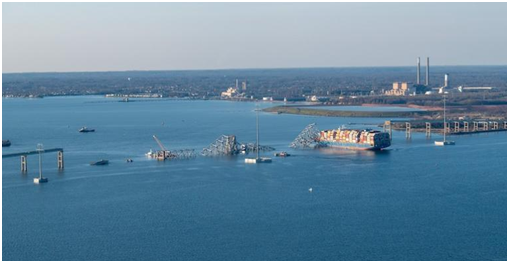
With the Port of Baltimore closed until further
notice following the tragic accident involving the Maersk-chartered Dali that left six dead, CMA CGM said it had determined a contingency plan
complying with Clause 10 of its Bill of Lading terms and conditions.
CMA CGM said that exports currently stranded at the Port of Baltimore
will remain there until the port re-opens and in the case of cargo rerouting to alternate
load ports the costs must be borne by the shipper…For import containers currently bound for Baltimore
and on the water these will be discharged at “an alternative port” for pick-up
where CMA CGM said its Bill of Lading would end.
Other major container lines issued similar notices on shipments to and
from the Port of Baltimore without using the term Force Majeure.
Hapag-Lloyd said in a customer advisory that all containers bound for
Baltimore would be re-routed to New York on request by Hapag-Lloyd at the
shippers’cost. Containers awaiting
shipment out of the Port of Baltimore would remain there unless written notice
is received from the shipper for an alternative load port at the cargo owner’s
account.
An advisory from Maersk, the charterer of the Dali,
said cargo on the water would be discharged at alternative US East Coast Ports
with the voyage terminating there.
“There will be an offer to customers on a case-by-case basis to cater for
inland movements due to limited truck/rail capacity available,” Maersk said.
With a lengthy closure of the Port of Baltimore
expected as salvage operations clear the wreckage of the bridge data and
analytics company Russell Group has estimated that it could affect $8 billion
worth of trade. This includes $1.49 billion of automobiles along with $377
million worth of coal exports that would be disrupted for the next six weeks,
based on estimates of at least a six week closure.
Force majeure is a clause that is included in
contracts to remove liability for unforeseeable and unavoidable catastrophes
that interrupt the expected course of events and prevent participants from
fulfilling obligations. These clauses generally cover natural disasters, such
as hurricanes, tornadoes, and earthquakes, as well as human actions, such as
armed conflict and man-made diseases, according to Investopedia.